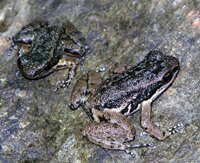 |


 |
|
||
  |
||
|
|

While helping a friend with a BP Conservation Programme project on the Caribbean island nation of Trinidad and Tobago, Jahson Alemu, a recent graduate who majored in biology, became inspired by his colleague’s work. He was impressed that someone similar to him, a young inspiring biologist, could actually be working on her own project. His friend, Kerri Narrangit, who is working to save the Trinidad Piping-Guan bird, was able to initiate her own research project thanks to the support which she received from the BP Conservation Programme in 2005.
This year, the BP Conservation Programme, now in its 16th year, awarded 27 winning teams from 21 different countries with grants totaling $475,000. The awards support the vital work of a new rising generation of conservation professionals and will help drive practical research projects addressing a wide range of global environmental issues from surveying chameleons in Madagascar to conserving sharks in Brazil to studying rare frogs in Tobago and working with local communities to protect birds in the Philippines.
This year, 19 teams were awarded “Future Conservationist Awards” and eight continuation awards were granted to teams previously supported by the program to further their work. Three of these teams received “Conservation Leadership Awards” and five teams received “Conservation Follow-up Awards.” The annual awards aim to develop leadership potential in a new generation of conservation professionals and address global conservation priorities by assisting and encouraging teams of young people to undertake important conservation projects globally.
“We always receive a wide range of projects from all over the world,” said Robyn Dalzen, program officer. “The BP Conservation Programme serves as an entry point for so many young conservationists who are just starting their careers.”
Alemu won the Future Conservationist award and is working to save the Bloody Bay Poison frog, a species that is endemic to the island of Tobago. The frog, which is not poisonous, was given its name because it was originally discovered in the Bloody Bay region of the island. Similar to many other amphibians in the world, the Bloody Bay Poison frog was abundant on the island, however, in recent years, its population has started to decline drastically. That decline, according to Alemu, is due to several factors; climate change and disease, both of which are affecting amphibian populations worldwide, and human impact, primarily through loss of habitat.
“Like all scientists, I am trying to figure out why these frogs are declining,” Alemu said.
Alemu hopes to have his research completed later this year and plans to submit his findings to the island nation’s government. From his research, he hopes that the government will create policies that are specific to conservation management for the islands’ amphibians. Currently, Trinidad and Tobago has policies for forest reserves and wildlife species, however, Alemu believes that these policies need to be strengthened and have a more species specific focus.
In addition, Alemu believes that one of the major benefits of his work will be submitting his data to the Global Amphibian Assessment (GAA), which is the first-ever comprehensive assessment of the conservation status of the world’s 5,918 known species of amphibians. Alemu’s data will help other scientists around the world to understand why amphibian populations are declining.
“I am hoping that my data will help us (amphibian specialists) determine ways that we can save our planets frogs,” Alemu says.
Alemu also wants to use the data he has collected to create education and conservation materials, which he plans to distribute on Tobago to make island inhabitants aware of the importance of protecting the Bloody Bay Poison Frog.
Learning to educate the public about conservation was a recent skill Alemu obtained through his participation in the BP Conservation Programme winner’s training course. The program not only awards funding for conservation research, but also provides winning teams with training. Participants spent two weeks of June in the United Kingdom, where they had the opportunity to meet and share their experiences with one another and to gain new skills and knowledge from experts in the fields of conservation education, communications and project planning and management—teaching participants such as Alemu how create momentum and awareness around their work.
“We not only aim to create a young global network of biodiversity conservation scientists, but this program also teaches participants how to train, educate and communicate within their respective countries the importance of conservation,” said Marianne Carter, program manager for the BP Conservation Programme.
Alemu is currently applying for graduate school and hopes to continue his career as a conservation biologist.
Return to the CELB Features index
|
 © CI, Robyn Dalzen Bloody Bay Poison Frog ADDITIONAL RESOURCES WEBSITES • BP Conservation Programme • CELB's Energy and Mining Program • Global Amphibians Assessment • Sign up to receive CELB's eNewsletter |
|